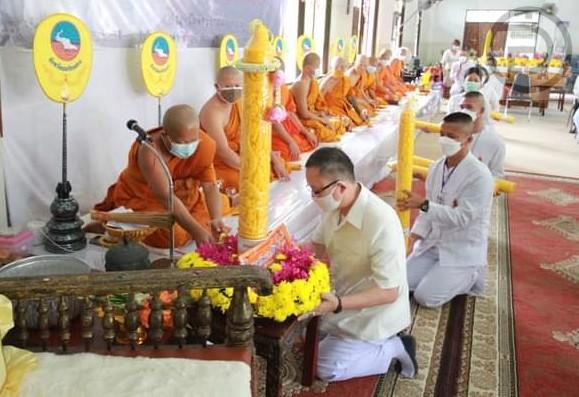Thailand –
Every Mid Summer in Thailand, usually July or August, is the start of Buddhist Lent, or Vassa. The exact date is the first day of the waning moon of the eighth lunar month.
To many tourists, it simply means no alcohol sales and if they have not done their research, can mean several days of bar closures and no parties on vacation. However, as is to be expected, it is much more, especially in a Buddhist country such as Thailand where it is estimated that 95% of the population is Buddhist.
The two day religious period begins with Asarnha Bucha Day and the start of Buddhist Lent, it is annually celebrated this year, 2023, on August 1st and 2nd, with dates varying each year based on astrological patterns. Also known as Dharma Day, this auspicious occasion commemorates the first sermon delivered by Lord Buddha, known as the “Dhammacakkappavattana Sutta,” to his first five disciples after attaining enlightenment.On this occasion, devout Buddhists visit temples to make merit, participate in candlelit processions around the main chapel, and listen to sermons by monks. The day holds immense spiritual importance as it symbolizes the beginning of Buddha’s teachings and the foundation of the Buddhist monastic order (Sangha).
Moreover, on these two particular days, the sale of alcohol will be prohibited. All government offices and main bank branches are also closed. This includes Thai Immigration.
Wan Khao Phansa, or Buddhist Lent Day, is the start of the three-month period during the rainy season when monks are required to remain in a particular place such as a monastery or temple grounds. Here, they will meditate, pray, study, and teach other young monks. In the past, monks were not even allowed to leave the temple, but today, most monks just refrain from traveling during this period. You will still see them out during the day.
Historically, this is because monks started remaining immobile in a temple during this time because they wanted to avoid killing insects and harming farmland. Apparently, traveling monks were crossing through fields, thus destroying the crops of villagers and farmers. After catching wind of this, Buddha decided that in order to avoid damaging crops, hurting insects, or harming themselves during the rainy season, monks should remain in their temples during these three months.
That being said, the tradition actually predates Buddha as early monks of various religions in India had a longstanding tradition of not traveling in the rainy season to avoid damage to crops or hurting insects.
Many people visit temples across Thailand to offer large candles to monks. Thai people do this for one of two reasons, the first being that monks once used candles to study after dark. The second reason is that people believed that offering a candle would, in return, make their own future a bright one of strength and longevity. During this time, people will also offer large yellow robes to the monks.
These three months are also a popular time for Thai boys and men to become ordained as monks. Though many will not go on to live as monks, they go through this process to fulfill the expectations of their family.
Like many other holidays in Thailand, no alcohol is served or sold during Wan Khao Phansa. Some Thais, in order to show their commitment to Buddhism, will give up drinking entirely during this three-month period. Others will also abstain from tobacco or eating meat. Some will also stop all sexual activity or relations.
Regardless, this is a very special time of year for devout Buddhists and one traveling or spending time in a Buddhist country should respect that.
Have a safe and pleasant holiday from TPN Media Thailand!




